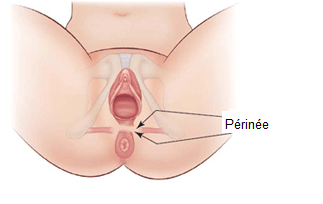Prendre soin de votre périnée
Conseils et rééducation après l’accouchement
Après la grossesse et l’accouchement, votre périnée a subi d’importantes modifications. Pour prévenir l’apparition ultérieure de troubles comme l’incontinence, accordez-lui une attention particulière.
Cette page vous donne des conseils de soins et propose des exercices de rééducation faciles, à la Maternité et à votre domicile.
Bleeding after childbirth
I am still bleeding after delivery and I have a stomach pain; is this normal?
Vaginal discharge or "lochia" is normal after childbirth; it gradually becomes less bloody, becoming pink, then yellow and white and ceases between the 2nd and 6th postpartum week.
Saignements
J’ai toujours des saignements après l’accouchement et j’ai mal au ventre, est-ce normal ?
Les écoulements sanguins ou "lochies" sont normaux après l'accouchement ; Ils diminuent progressivement de sanglants, ils deviennent rosés, puis blancs jaunâtres et cessent entre la 2ème et la 6ème semaine post-partum.
Return to work
I have to return to work, what should I do about breastfeeding?
Returning to work depends on your contract and your employer. Depending on your wishes or your options, you can continue breastfeeding, for example the morning and evening milk can be stored. You can express your milk and keep it in the fridge to provide meals for your baby during the day. The alternative is weaning, either by spacing feedings to reduce milk secretion, or by using appropriate drugs. Prepare for your return to work by contacting a breastfeeding professional.
Reprise du travail
Je dois reprendre mon travail, comment faire avec l’allaitement ?
Perineum
How do I care for my perineum?
Whether your perineum is stitched or not, it requires hygiene care. It is important to:
- Rinse (with mild soap or Kamillosan) every time you urinate
- Dry thoroughly
- Regularly change sanitary towels
The stitches heal and the threads are spontaneously resorbed within about ten days.
Perineum care:
Perineal rehabilitation (strength training for the perineum) is important, and can be started within the first two months after childbirth.
Périnée
 Qu’est-ce que le périnée ?
Qu’est-ce que le périnée ?
Le périnée (ou plancher pelvien) est un ensemble de muscles qui ferme le bas du bassin et comporte trois orifices: le méat urinaire, le vagin et l’anus. Il joue un rôle important pour la continence urinaire et anale en soutenant, comme un hamac, la vessie, l’utérus et les intestins.
Hemorrhoids
I have hemorrhoids, what should I do?
Pregnancy can lead to hemorrhoids. They are due to the compression of the uterus on the large blood vessels, a hormone (progesterone) and constipation. Hemorrhoids can be painful and can result in bleeding, but they do not represent a risk to your baby.
Talk to your physician.
Practical advice:
- Avoid constipation
- Your physician may prescribe a hemorrhoid cream
- Avoid prolonged standing
Hémorroïdes
J’ai des hémorroïdes que dois-je faire ?
Les hémorroïdes peuvent être favorisées par la grossesse. Elles sont dues à la compression de l’utérus sur les gros vaisseaux sanguins, à une hormone (la progestérone) et à la constipation. Les hémorroïdes peuvent être douloureuses et saigner, cela ne représente pas de risque pour votre bébé.
Parlez-en à votre médecin.
Conseils pratiques :
Pre-eclampsia
My feet and hands are swollen, what should I do?
Edema of the hands and feet are common in the third trimester of pregnancy. They are more likely to occur with prolonged standing or heat. But beware, if they increase suddenly, if they are accompanied by headaches, "floaters" in front of the eyes, ringing in the ears, nausea, vomiting, irritability and/or pain in the upper part of the stomach, consult your physician quickly as this could indicate a pregnancy-related disease, pre-eclampsia.
Practical advice: